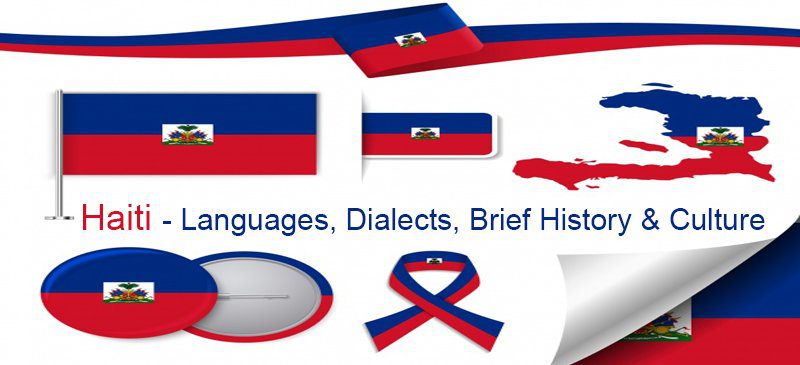
Famed for being part of the Hispaniola Island in the Caribbean first discovered by Christopher Columbus, Haiti’s original inhabitants were known as Arawak Indians. For a considerable period, it was under the brutal colonization of Spain before pressure from other rival European colonialists forced the ceding of the Western part of the Island to France in 1697. That is what makes up present-day Haiti.
The official languages in Haiti are Creole and French, however, English is used mainly in tourist areas, making Haitian-Creole English translation absolutely necessary for facilitating smooth communication with visiting tourists from the USA and elsewhere in the English speaking world. Its population is composed largely of blacks and Mulattoes who are incapable of uniting in any terms.
Independence Through Rebellion and Persistent Political Unrest
Being the only place where slaves successfully rebelled against their masters is a historical fact for which Haiti is well-known. In fact, its independence was a direct consequence of the slave rebellion. Despite that, Haiti has gone through long periods of social, civil, and political unrest, starting from the Haitian revolution through occupation by the U.S. to the UN-sponsored stabilization mission sent there in 2004.
A notable thing about Haiti is the succession of dictatorships, economic hardships, and natural disasters that it has witnessed at regular intervals. It is a place defined by indebtedness, devastating disasters like the 1842 earthquake, economic stagnation, and rule by military juntas.
Languages, Culture, and Religion
Throughout the country, Haitian Creole is the language mainly spoken. It is heavily influenced by West African languages, Portuguese, English, Tiano, and even Spanish. Apart from Haitian Creole, English, and French-based Creole are frequently used in different parts of the country. Sometimes known as Kreyol, its vocabulary and pronunciation are mostly derived from French but its syntax is the same as that of other Creoles. Interestingly, the Tiano people who were the original inhabitants of the Island, have witnessed their language become extinct.
To find it easy to interact with the Haitians if you do not speak any of their languages, an over-the-phone Creole English Interpreter can help you along. This is because Haitian Creole is spoken in three different dialects in the Northern, Central, and Southern regions. For purposes of prestige, the French language is preferred over Haitian Creole, and so the latter is rarely used in official communication. It is mostly used in its spoken form.
The Preference of Foreign Languages for Official Communication
There is a lack of diversity regarding the languages spoken in Haiti. Most of the population speak Haitian Creole and French even though a small segment of the population considered elitist prefer foreign languages such as Spanish and English. In institutions like hospitals, French and English are mainly used making it crucial to have a French English medical interpreter on standby all the time just in case the necessity for interpretation arises. A lot of collaborations with foreigners and the establishment of business ties are driven by the Elite population. Wealthy citizens often think and view themselves as French.
Social Conventions and Religion.
Haiti is perhaps the only country in the world where there is a complete fusion between religion and witchcraft. Have you ever heard of Voodooism? Voodoo is regarded as an official religion matching Catholicism in preference. Over 70% of the population practices voodoo compared to about 75% who practice Christianity.
Having ties with African traditional religions, voodooism is characterized by polytheistic beliefs that incorporate folklore, song, dance, incantations, and complicated rituals. Perhaps that is why Haitians do not practice elaborate social conventions. Dressing, for instance, is limited to beachwear and only a few formal occasions like formal dinners require a stricter dressing code.
Love for Symbolism
Haitians give symbolism a place of importance in their historical and cultural associations. Significantly, the French expulsion in the 1804 rebellion made Haiti the first black-ruled independent nation in the world. It was also the second country in the Western world to gain independence from an imperial power.
The flag is its most notable symbol followed by Henri Christophe’s citadel than the statue of the “unknown maroon” known as Maroon inconnu. It portrays the fervor of a bare-chested revolutionary using a conch shell to trumpet the call to arms. Another important national symbol is the presidential palace.
Generally, the seeming isolation of Haiti through the centuries has seen the peasantry developing distinct traditions in music cuisine, dress, dance, religion, and rituals. Several elements of the African traditions and culture like words, multitudes of spirit entities, specific prayers, and forms of worship still survive in Haiti. However, the Haitian culture is distinctly different from the African cultures, or any other contemporary culture.
And lastly, did you know the word Haiti means a mountainous country in Tiano? Yes, the place has the highest number of mountains and hills in the Caribbean.
